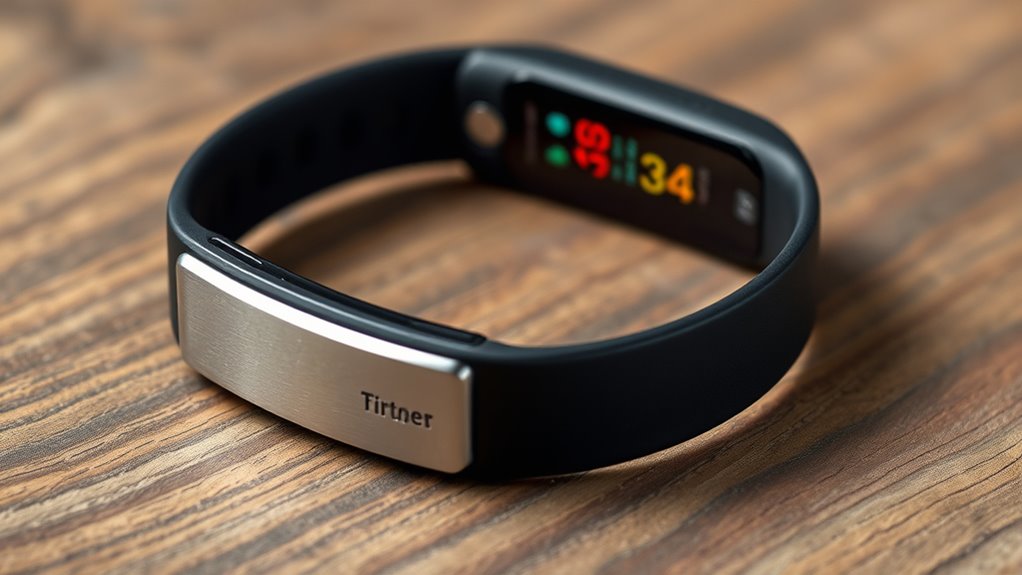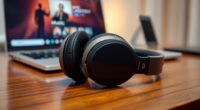To choose the best fitness tracker, make certain it syncs smoothly with your devices and fits into your ecosystem, whether iOS or Android. Prioritize features that match your goals, like heart rate monitoring or sleep tracking, and check for accurate sensors. Consider battery life, comfort, and stylish design for all-day wear. Don’t forget to evaluate price, warranty, and customer support to find a reliable device. Keep exploring to discover how to pick a tracker that truly meets your needs.
Key Takeaways
- Ensure compatibility with your devices and preferred health apps for seamless data synchronization.
- Prioritize accurate sensors and reliable tracking features aligned with your fitness goals.
- Consider battery life and wearability to match your daily routine and comfort needs.
- Check for water resistance and durability for versatile use during various activities.
- Evaluate price, warranty, and customer support to ensure long-term satisfaction and device reliability.
Assessing Compatibility With Your Devices and Ecosystem
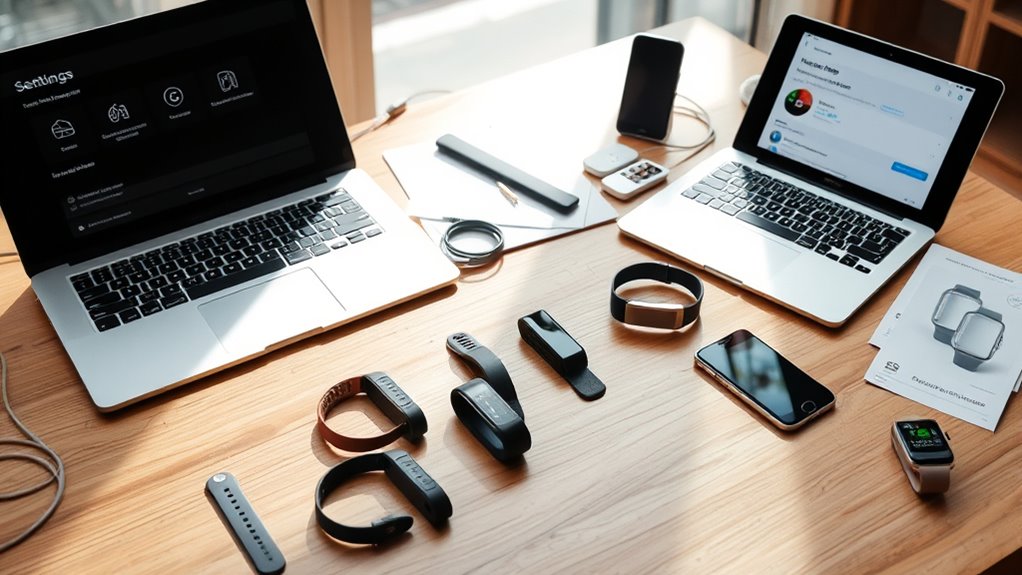
Before choosing a fitness tracker, it’s important to take into account how well it integrates with your existing devices and ecosystem. Check if it can sync seamlessly with your smart home setup, allowing you to control lights, thermostats, or other connected devices easily. Compatibility with third-party apps is also vital, as it enhances your ability to track data across different platforms and access additional features. Ensure the tracker supports popular apps you already use, like health or fitness apps, so you don’t have to switch between multiple systems. A device that integrates smoothly with your ecosystem saves you time and effort, providing a more streamlined experience. Additionally, understanding the compatibility standards of your devices can help ensure a more cohesive and hassle-free integration. Recognizing the support for different operating systems can further improve compatibility, especially if you use multiple types of devices. This understanding can also facilitate data synchronization across various platforms, making it easier to keep all your health information up-to-date. Being aware of privacy and data sharing policies is crucial to safeguard your personal information when connecting multiple devices and apps. Ultimately, compatibility ensures your fitness tracker becomes a cohesive part of your digital environment, maximizing its usefulness and convenience.
Prioritizing Features That Match Your Fitness Goals
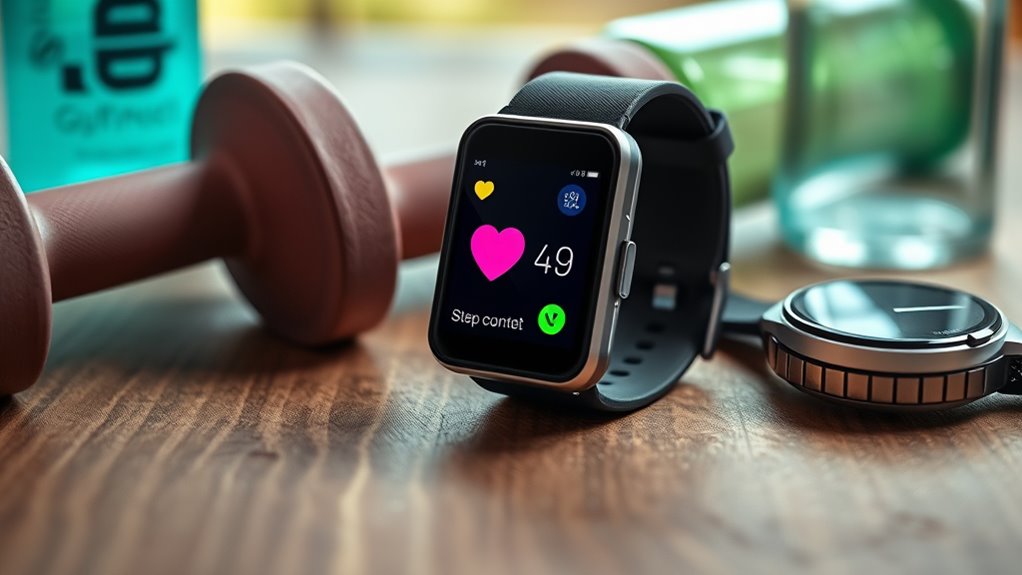
To choose the right fitness tracker, you need to focus on features that align with your specific fitness goals. If improving cardiovascular health is a priority, look for one with accurate heart rate monitoring to track your intensity levels during workouts. If better sleep quality matters, opt for a device with sleep tracking capabilities that provide insights into your sleep patterns and duration. Consider whether you want features like step counting, calorie tracking, or GPS, depending on your focus. Prioritize the functionalities that will keep you motivated and help you measure progress effectively. By matching the device’s features to your goals, you’ll stay engaged and make meaningful improvements in your fitness journey.
Evaluating Battery Life and Charging Needs

Since your fitness tracker’s battery life directly impacts how often you need to charge it, evaluating its longevity is essential. Look for devices with good battery optimization to minimize charging frequency. Some trackers last several days, while others need daily charges. Consider how often you’ll need to recharge based on your routine. Here’s a quick comparison:
| Tracker Model | Battery Life | Charging Frequency |
|---|---|---|
| Model A | 7 days | Weekly |
| Model B | 3 days | Every 3 days |
| Model C | 14 days | Bi-weekly |
Choosing a device with longer battery life reduces interruptions, especially if you’re active or forgetful about charging. Keep in mind your lifestyle to pick a tracker that fits your charging needs seamlessly. Additionally, some models incorporate power-saving features that extend battery longevity even further. Knowing about battery optimization techniques can help you maximize your device’s performance and reduce the frequency of recharges.
Considering Design, Comfort, and Wearability
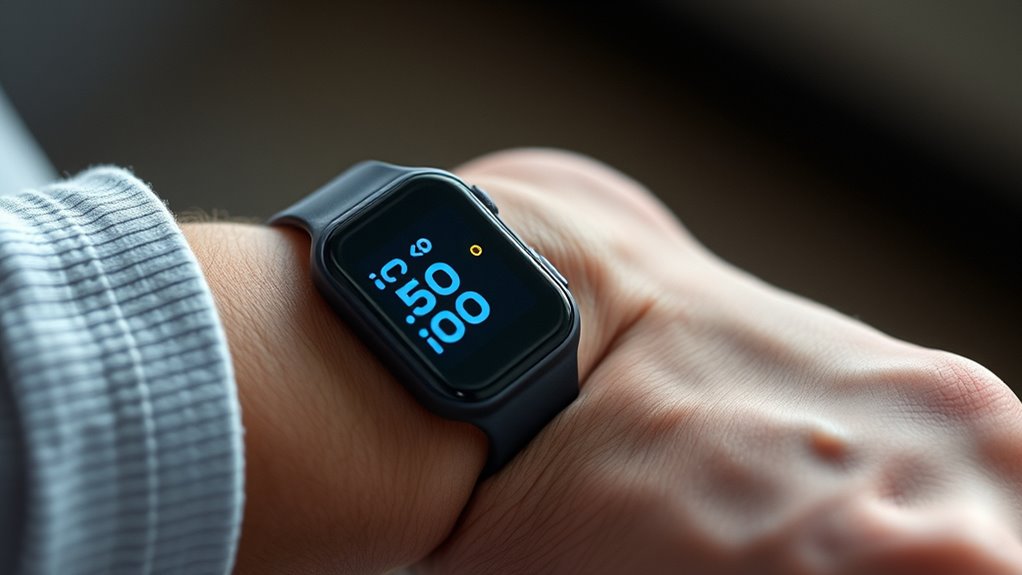
Your fitness tracker should look good and match your style, so consider its design and aesthetics. Comfort is key, so check how the fit feels and what materials are used. A wearable that’s both stylish and comfortable will motivate you to wear it consistently. Additionally, selecting a tracker with crochet styles for locs can enhance usability and ensure it meets your fitness needs.
Design Aesthetics and Style
When choosing a fitness tracker, paying attention to design aesthetics and style is essential because you’ll likely wear it daily. Look for a device with color options that match your personal style, whether you prefer bold hues or subtle shades. The variety of strap styles also matters; some trackers offer adjustable, interchangeable straps for customization, enhancing both look and comfort. A sleek, minimalist design can blend seamlessly with everyday outfits, while a sportier look suits active days. Consider how the tracker’s design reflects your personality and lifestyle, making it a natural accessory rather than an afterthought. Remember, a stylish tracker that appeals to you increases the likelihood you’ll wear it consistently, helping you stay motivated and on track. Incorporating natural materials into the design can also add an authentic farmhouse touch to your look, making it feel more personalized. Additionally, choosing a holistic approach to design that considers comfort and wearability ensures you can enjoy your device without discomfort during extended use. Paying attention to wearability features like lightweight construction and ergonomic design can significantly improve your daily experience. Furthermore, selecting a device with advanced materials can enhance durability and comfort during prolonged use.
Fit and Material Comfort
Choosing a fitness tracker that fits comfortably and feels good on your wrist is vital for consistent wear. Look for a device made from soft, breathable materials that won’t cause irritation or discomfort during extended use. Material softness directly impacts how pleasant it is to wear daily, especially if you have sensitive skin. Additionally, fit adjustability is essential; a tracker with multiple size options or an adjustable strap ensures a snug yet comfortable fit. A secure fit prevents the device from slipping or feeling too tight, which can distract you from your workouts or daily activities. Prioritize comfort and adjustability to make your fitness tracker an effortless part of your routine, encouraging consistent use and accurate tracking. Incorporating lightweight design can further enhance comfort for all-day wear. Moreover, selecting a tracker with advanced materials that offer durability and breathability can help maintain comfort over time. Choosing the right material can also influence the wearability and overall experience of the device throughout your daily activities. Understanding material quality can guide you to select a device that balances comfort, durability, and style for long-term satisfaction.
Analyzing Data Accuracy and Tracking Capabilities
You need a fitness tracker that provides accurate measurements you can trust. Check how precise its sensors are and whether they consistently deliver reliable data. Also, make sure it’s compatible with your devices to seamlessly sync your stats and track progress. Additionally, consider whether the tracker offers consistent performance to ensure your data remains dependable over time. Reliable sensor technology is crucial for maintaining measurement accuracy during various activities.
Sensor Precision and Reliability
Sensor precision and reliability are critical factors that directly impact how accurately your fitness tracker monitors your activity. High-quality sensors ensure your heart rate readings are consistent and your sleep tracking is detailed. Poor sensor dependability can lead to inaccurate data, undermining your trust in the device’s performance. To evaluate sensors, consider the following:
| Feature | Importance | Example |
|---|---|---|
| Heart Rate Accuracy | Reflects true exertion levels | Consistent during workouts |
| Sleep Tracking | Monitors quality and duration | Detects restless sleep stages |
| Sensor Durability | Maintains precision over time | Lasts through daily wear |
| Data Consistency | Ensures reliable long-term data | Tracks progress accurately |
Prioritize trackers with proven sensor reliability for better health insights. Additionally, choosing a device with advanced sensor technology can greatly enhance measurement accuracy and user confidence, especially when considering the accuracy of data collection. Ensuring that the sensors are robust and reliable can also prevent discrepancies caused by environmental factors or wear and tear. Regular calibration and maintenance of sensors can further improve their long-term performance.
Compatibility With Devices
Ensuring your fitness tracker works seamlessly with your existing devices can substantially enhance data accuracy and tracking capabilities. Device compatibility is vital for reliable information, so check if it pairs easily with your smartphone, tablet, or computer. Ecosystem integration also matters; a tracker that syncs smoothly with your preferred apps and platforms will give you a comprehensive view of your health data. Some trackers work best within specific ecosystems, like iOS or Android, which can improve synchronization and functionality. Before buying, verify compatibility with your device’s operating system and other health apps you use regularly. This guarantees your data stays accurate and your tracking remains consistent, helping you stay motivated and informed on your fitness journey. Additionally, reviewing data accuracy and tracking capabilities can help ensure the tracker provides precise insights aligned with your fitness goals. Understanding device compatibility can prevent frustrations and ensure a smooth user experience. Incorporating features like water resistance can also be beneficial if you plan to wear your tracker during swimming or intense workouts.
Reviewing Price, Warranty, and Customer Support
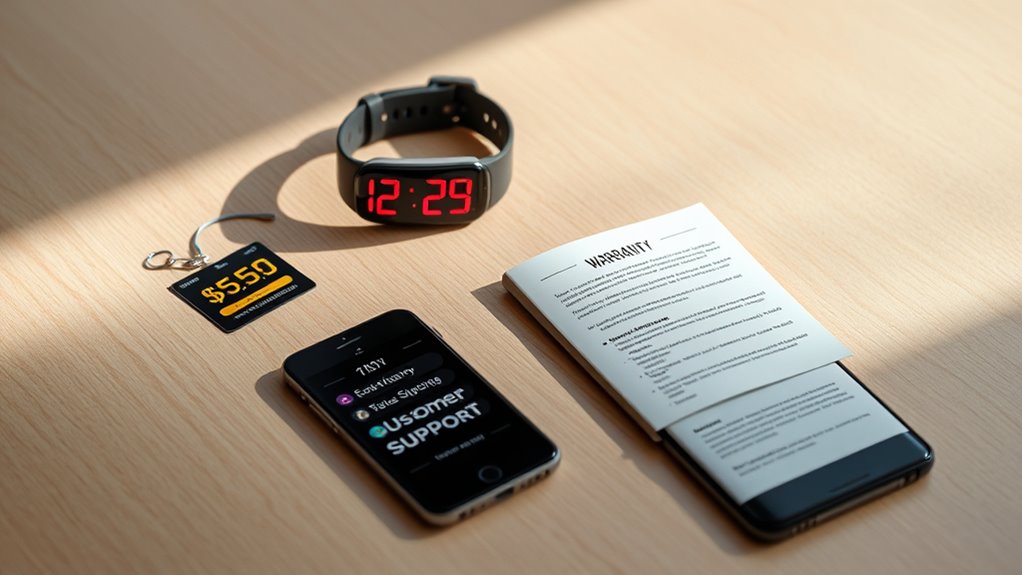
How do price, warranty, and customer support influence your choice in a fitness tracker? These factors are vital because they directly impact your investment’s value. A competitive price ensures you’re getting a good deal, but don’t sacrifice quality for cost. Check customer reviews to see if users report durability and reliable performance; positive feedback often reflects strong brand reputation. A solid warranty shows the manufacturer’s confidence in their product and offers peace of mind if issues arise. Customer support is equally important; responsive help can save you time and frustration if problems occur. Combining these elements helps you select a fitness tracker that’s both affordable and backed by trustworthy service, guaranteeing a satisfying and long-lasting experience.
Frequently Asked Questions
How Do Fitness Trackers Integrate With Third-Party Health Apps?
Fitness trackers usually integrate with third-party health apps through app synchronization, allowing seamless data sharing. You simply connect your device to the app, enabling it to access your activity, heart rate, and sleep data. Be mindful of data privacy, as sharing sensitive health info requires secure connections and permissions. Always review the app’s privacy policies to ensure your data remains protected while benefiting from thorough health tracking.
Can Fitness Trackers Monitor Specific Sports or Activities Accurately?
Imagine you’re in 1885, and a fitness tracker is like a magic crystal ball. Today, these devices offer impressive activity accuracy, but their sports specificity varies. For certain activities like running or cycling, they tend to be quite precise. However, for more complex sports like tennis or weightlifting, the activity accuracy drops. So, if you’re serious about precise monitoring, choose a tracker designed for your sport to get the best results.
Are There Any Hidden Costs or Subscription Fees Involved?
When considering fitness trackers, you should be aware of hidden costs and subscription fees. Some devices require ongoing payments for premium features, advanced insights, or app access. These hidden costs can add up over time, so it’s important to read the fine print before purchasing. By understanding potential subscription fees, you can choose a tracker that fits your budget and avoid surprises, ensuring you get the most value from your investment.
How Secure Is My Personal Health Data on These Devices?
Think of your health data as a treasure chest; you want it protected. Most fitness trackers use data encryption to keep your info safe from pirates. Check their privacy policies to see how they handle your data—some share it, others keep it locked away. You’re in control, so choose a device that values your privacy, ensuring your health secrets stay secure, just like a trusted guardian.
Do Fitness Trackers Support Multiple User Profiles?
Many fitness trackers support multiple users, making it easier for families or friends to share one device without mixing data. You can set up shared accounts or create separate profiles within the app. This way, each person’s activity and health info stay private while using the same tracker. Always check the device’s features to guarantee it offers multiple user support, so everyone gets accurate, personalized insights.
Conclusion
Choosing the perfect fitness tracker is like finding your ideal running partner—one that moves with your rhythm and keeps you motivated. By matching it to your devices, goals, and style, you’ll turn your fitness journey into an exciting adventure. Don’t settle for a tracker that’s just okay; seek one that sparks your passion and keeps you on track. With the right companion, every step becomes a leap toward a healthier, happier you.
